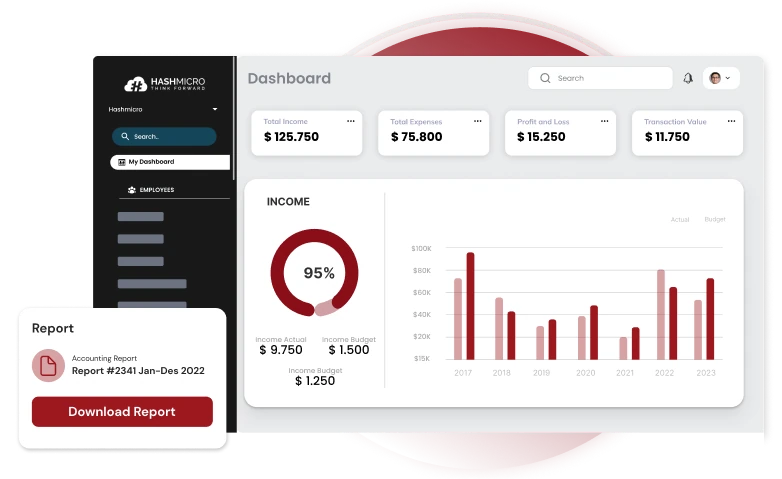Retaining profits is just as crucial as earning them. The retention ratio or plowback ratio shows how much net income a company keeps for reinvestment instead of paying it out as dividends. It’s a key metric for evaluating a company’s growth potential and financial strategy.
Investopedia defines the retention ratio as the portion of net income kept for business growth, but doesn’t state a global average. Their Meta example shows a 189% ratio far above the typical 60% and not reflective of international norms.
HashMicro Accounting Software helps track retained earnings in real time, making financial reports more accurate and transparent. With features such as automated journal entries and real-time dashboards, businesses can manage their profits more effectively.
Just as this article illustrates, understanding your retention ratio enables leaders to make more informed decisions, whether it’s about budgeting, dividends, or long-term planning.
Key Takeaways
|
What is Retention Ratio?
The retention ratio is a financial metric that indicates the portion of net income a company retains for reinvesting in the business.</span> It is calculated by subtracting dividends from net income, then dividing the result by net income, or simply: 1 minus the dividend payout ratio.
This ratio is significant for evaluating a company’s growth strategy. A high retention ratio typically indicates a focus on expansion, such as funding new projects, acquiring assets, or improving infrastructure.
In contrast, a low plowback ratio suggests that the company prefers to return earnings to shareholders, a common practice among mature, dividend-paying firms.
Understanding this helps investors and business owners assess how earnings are managed. It also provides insights into whether the company is prioritizing reinvestment or income distribution, which can influence long-term value and sustainability.
Retention Ratio Formula
The retention ratio is calculated by measuring the percentage of a company’s net income that is retained for reinvestment after dividends are paid out. It can be expressed with the following formula:
Retention Ratio = (Net Income − Dividends) / Net Income
Alternatively, it can also be calculated as:
Retention Ratio = 1 − Dividend Payout Ratio
These formulas provide a quick way to understand how earnings are being used. For example, if a company has a net income of $1 million and pays $200,000 in dividends, the retention ratio would be 0.8 or 80%.
This means 80% of the profits are retained for future use, such as business expansion or debt reduction.
How to Calculate Retention Ratio?
Calculating the retention ratio is straightforward and closely related to liquidity analysis using the quick ratio formula. Start by identifying net income and total dividends for a period, subtract dividends to find retained earnings, then divide the result by net income.
Formula:
Retention Ratio = (Net Income − Dividends) / Net Income
For example, if a company earns $500,000 in net income and pays $100,000 in dividends, the retention ratio is:
(500,000 − 100,000) ÷ 500,000 = 0.8 or 80%.
This means the company keeps 80% of its profits to reinvest in the business. A higher ratio often suggests a focus on long-term growth, while a lower ratio indicates more profit is being returned to shareholders.
How HashMicro Accounting Software Helps Calculate Retention Ratio
Manually tracking net income and dividend payouts can be both time-consuming and prone to errors. HashMicro Accounting Software automates this process by providing accurate, real-time financial reports that simplify and streamline the calculation of the retention ratio.
With features like automated reports and dividend tracking, HashMicro enables you to calculate the plowback ratio. Eliminating the need for manual calculations using spreadsheets. Book a free demo today to experience it firsthand.
By streamlining financial reporting and analysis, HashMicro enables businesses to stay on top of profit allocation. It makes informed data-driven reinvestment decisions and enhances overall financial transparency.
Key features of HashMicro Accounting:
- Hashy AI Finance: AI-powered software for automating reports, analyzing profitability, and forecasting cash flow with real-time insights and auto-reconciliation.
- Bank Integration – Auto Reconciliation: Connects your bank accounts directly to the system, enabling automatic transaction imports and real-time reconciliation, reducing errors and saving time on manual matching.
- Multi-Level Analytical: Allows users to analyze financial data across multiple dimensions—such as department, project, or cost center—for more detailed performance insights and decision-making accuracy.
- Profit & Loss vs Budget & Forecast: Compares actual income and expenses against planned budgets and forecasts, helping businesses evaluate financial performance and adjust strategies proactively.
- Cash Flow Reports: Provide real-time visibility into incoming and outgoing cash, allowing businesses to manage liquidity, monitor financial health, and ensure sustainable operations.
- Budget S Curve: Visualizes planned versus actual budget usage over time in an S-curve format, ideal for tracking project spending progress and identifying variances early.
Conclusion
The retention ratio is a key financial metric that shows how much profit a company retains for reinvestment rather than distributing it as dividends. It offers valuable insight into a company’s growth potential and financial strategy.
Understanding and monitoring the plowback ratio is essential for business owners, financial managers, and investors alike. It helps evaluate how effectively a company is using its earnings to sustain and scale operations over time.
With HashMicro Accounting Software, calculating and analyzing the plowback ratio becomes faster and more accurate. Features like retained earnings management, dividend tracking, and automated reports provide the clarity needed to make strategic financial decisions.
Get started today—book a free demo of HashMicro Accounting Software and streamline your financial management.
FAQ About Retention Ratio
-
What does 80% retention rate mean?
Customer retention rate refers to the proportion of customers a company successfully keeps within a specific time frame. For instance, if you begin the year with 10 customers and two leave, your retention rate is 80%. Think of it as making sure guests stay engaged and happy at a dinner party.
-
What’s a good retention rate?
A retention rate of 90% or above is generally seen as strong, indicating that companies should aim to keep employee turnover at or below 10%.
-
Can retention factor be 1?
A retention factor of 0 would mean that your sample spends no time in the stationary phase and is not retained on the column. A retention factor of 1 would mean that the analyte spends equal amounts of time in the stationary phase as the mobile phase.


































